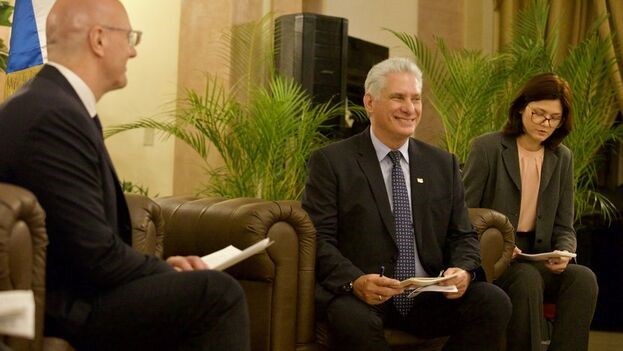Source: 14ymedio and Havana Times

HAVANA TIMES – In many Cuban houses there is still a wooden Matryoshka, an empty bottle of Moscow Red perfume, or a copy of Sputnik magazine. The Soviet presence was so intense on our Island that, for the children who grew up between the 70s and 80s, the USSR was like a powerful and severe stepmother. Today, we see the Kremlin envoys arrive again and, although they look different in their suits and ties, we know that they are seeking the same thing: to use our country as a geostrategic chess piece that is too big for us, very big.
The same day that the Group of 7 summit began in Japan, Cuba President Miguel Díaz-Canel ratified to the Russian Deputy Prime Minister, Dmitri Chernishenko, “Cuba’s unconditional support for the Russian Federation in its confrontation with the West.” In Hiroshima the meetings revolved around how to tighten sanctions to corner Vladimir Putin over his invasion of Ukraine, but in Havana the red carpet was rolled out for the former KGB agent’s narrow circle of power. It was no coincidence.
Increasingly isolated internationally and with a war in which it has not won the stunning victory it had hoped for, the Russian regime is in dire need of alliances. The urge is not only on the diplomatic level to pretend that it maintains loyal partners in some parts of the planet, but also for its friends help it evade sanctions. Until the beginning of the invasion, Putin had shown several signs of disinterest towards the Island, several joint projects were even canceled due to the inefficient actions of the Cuban side. But the war campaign changed everything.
Havana rapidly aligned itself with Moscow’s discourse and began to call the entry of troops into Ukrainian territory a “special military operation.” It avoided condemning the Russian actions at the United Nations and blamed Kiev for the start of the conflict. Then began a slew of announcements of new agreements signed, of credits granted by the Kremlin and of visits by officials to both sides of the Atlantic. As more photos surfaced with bureaucrats from both countries signing contracts and memorandums of understanding, concern grew among Cubans.
The unease that overwhelms us now comes for several reasons. We know the intensity of the presence that the Russians can have in our country, their infinite willingness and ability to meddle in ministries, offices and barracks. We know that the Díaz-Canel regime is bankrupt and that to save what remains of Castroism it is capable of auctioning off the Island piece by piece. We intuit that a fat check from Moscow would allow the unpopular engineer in the president’s seat to continue at the helm of the nation and reinforce the repression. We also understand that Putin is only interested in us because we are 90 miles from the United States, his archenemy, and located in Latin America, a region in which he wants to have a significant area of influence.
Furthermore, we suspect that with those collar-and-tie envoys who arrive in Havana these days, a democratic change will not come to us, nor more freedoms, much less greater respect for human rights. It points to the opposite. When Chernishenko announced last Friday the creation of “a road map” to accelerate the rapprochement between the two countries, “which might require some changes in Cuban legislation,” he is not thinking of decreeing more spaces for dissidence or a framework of respect for independent media. Rather, it is about paving the way for the Russians to control portions of the national economy and run wild in other spheres as well.
They will bring us, yes, their methods. The ability for obscure agents of the political police to amass an empire, for Party bigwigs to take over the most appetizing industries, and for money from public property liquidations to end up mostly in in the hands of ideological comrades who will exchange their military uniforms for the elegant clothing of the oligarchs.
Translated by Translating Cuba

